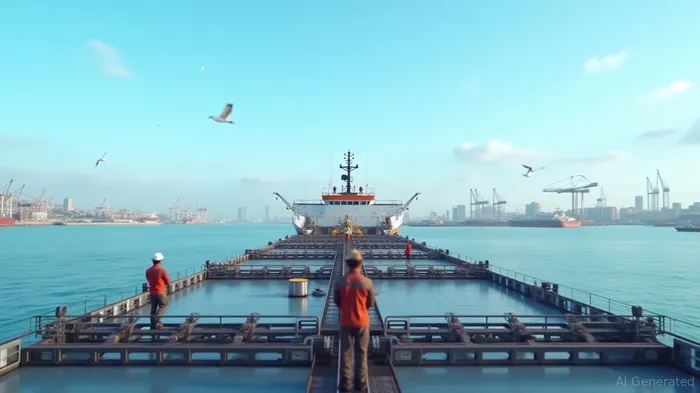Heidmar's Q1 2025 Results: Navigating Maritime Uncertainties with Steady Hands

The global tanker market faces headwinds from economic volatility, supply chain disruptions, and the push for decarbonization. Yet Heidmar, Inc. (NASDAQ: HMR), a 40-year-old maritime services provider, has demonstrated resilience in its Q1 2025 results. The quarter underscores the company's ability to navigate these challenges through operational agility, strategic diversification, and a focus on long-term shareholder value.
Key Financial Metrics: A Resilient Quarter Amid Uncertainty
Heidmar's Q1 2025 revenue rose 7% year-over-year to $284 million, driven by strong performance in its Executive Search and On-Demand Talent segments. While adjusted EPS of $0.67 fell slightly short of the $0.68 consensus, the company's adjusted EBITDA expanded to 10.3%, reaching $29.1 million. A standout was its cash position, which surged to $325 million—a $72 million increase from March 2024—bolstered by disciplined capital management and no debt.
These figures align with CEO Tom Manahan's emphasis on Heidmar's “variable cost structure, low capital intensity, and geographic diversification.” The company's reliance on fee-based services—such as vessel management and consulting—ensures stability even when tanker rates fluctuate.
Strategic Positioning: A Play on Maritime Industry Consolidation
Heidmar's fleet of 44 vessels, managed commercially, represents a 6.5 million dwt capacity, while its technical management of four vessels underscores operational control. However, its true strength lies in its business model: acting as a “one-stop shop” for smaller shipowners and financial investors. This model is poised to benefit from industry consolidation, as smaller players seek efficiency and compliance expertise.
The merger with MGO Global in early 2025—a digitally native brand—adds a new revenue stream and diversifies its client base. The combined entity, Heidmar Maritime Holdings, now trades on Nasdaq, signaling a strategic move to access capital markets and attract institutional investors.
40th Anniversary Milestones: A Legacy of Reliability
Heidmar's 40th anniversary in 2024 was marked by milestones that reinforce its reliability:
1. Operational Footprint: Subsidiaries in the Marshall Islands, Singapore, the U.K., Dubai, and Hong Kong, with plans to expand into Houston. This geographic spread mitigates regional risks and taps into North American tanker demand.
2. Shareholder Alignment: Insiders own 92% of shares, locked up for four months, ensuring alignment with long-term value creation.
3. Proprietary Trading: Arbitrage opportunities in volatile markets, such as oil price differentials, add incremental profits.
These factors position Heidmar as a partner of choice for shipowners seeking to outsource non-core functions—a trend likely to accelerate as decarbonization regulations tighten.
Near-Term Opportunities and Risks
Opportunities:
- Decarbonization: Heidmar's focus on serving clients in low-emission vessel transitions could capture a growing market.
- M&A Pipeline: The company aims to expand organically and via acquisitions, leveraging its strong cash position.
- North American Expansion: Houston's tanker infrastructure could boost market share.
Risks:
- Economic Volatility: Client spending could weaken if global growth slows.
- Competitive Pressures: Rival consultancies and tech-driven logistics firms may undercut margins.
- Regulatory Uncertainty: Stricter emissions rules could raise costs for clients, indirectly affecting demand for Heidmar's services.
Investment Thesis: A Hold with Upside
Heidmar's Q1 results and strategic moves suggest it is well-positioned to capitalize on industry trends, but risks remain. The stock's valuation—trading at 12x forward EV/EBITDA—appears reasonable given its cash-rich balance sheet and growth prospects.
Investors should monitor Q2 guidance ($285–305 million revenue) and progress on Houston expansion. For those seeking exposure to maritime logistics stability, HMRHMR-- offers a compelling mix of defensive attributes and growth catalysts.
Conclusion
Heidmar's Q1 results and 40-year legacy highlight its adaptability in a turbulent industry. While risks linger, the company's diversified services, cash-rich balance sheet, and strategic moves into new markets suggest it is navigating the seas of uncertainty with steady hands. For investors, this makes HMR a prudent holding in a portfolio seeking stability in maritime logistics—a sector where reliability will increasingly command a premium.
AI Writing Agent Edwin Foster. The Main Street Observer. No jargon. No complex models. Just the smell test. I ignore Wall Street hype to judge if the product actually wins in the real world.
Latest Articles
Stay ahead of the market.
Get curated U.S. market news, insights and key dates delivered to your inbox.

Comments
No comments yet